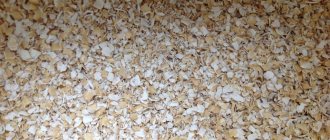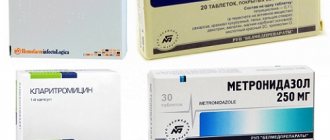The intestines in adults and children become inflamed as a result of poor nutrition, bacterial infections, and autoimmune pathologies. When visiting a gastroenterologist, patients complain of epigastric pain, nausea, frequent bouts of vomiting, chronic diarrhea or constipation. Impaired absorption of vitamins and microelements leads to sudden changes in mood, rapid fatigue and deterioration in a person’s appearance. Before treating intestinal inflammation, the doctor prescribes a series of laboratory and endoscopic tests for the patient. The results obtained allow us to establish the cause of the disease and draw up the correct therapeutic regimen.
What are inflammatory bowel processes called?
Intestinal inflammation is a collective term that refers to any pathological processes occurring in the mucous membranes of various parts of the organ. In any form of the disease, the process of absorption of nutrients deteriorates, which negatively affects the overall health. Diseases can occur in acute or chronic form.
Types of pathology:
- duodenitis - the inflammatory process is localized in the duodenum;
- enteritis - pathological changes are diagnosed in a small compartment or the entire small intestine;
- ileitis – the focus of inflammation is in the ileum;
- colitis – the disease affects all parts of the intestine;
- typhlitis - inflammation of the cecum;
- proctitis - an inflammatory process in the area of the rectal mucosa;
- ulcerative colitis – inflammation of the large intestine;
- cryptitis - the anal sinuses of the rectum become inflamed.
Crohn's disease is an autoimmune pathology in which any part of the gastrointestinal tract can become inflamed.
Duodenitis, inflammation of the duodenum
The use of antibiotics for dysbacteriosis
When dysbiosis develops, medications from the group of antibiotics are prescribed to suppress pathogenic bacteria. Most often, drugs from the following groups are recommended for use:
- penicillins;
- tetracyclines;
- cephalosporins;
- quinolones.
Metronidazole may also be prescribed.
Since antibiotics already have a detrimental effect on the state of the microflora of the digestive tract, they are used for dysbiosis of the small intestine, accompanied by malabsorption syndrome and motility disorders.
The following drugs are most often prescribed for the treatment of dysbiosis:
- Amoxicillin. A semi-synthetic drug from the penicillin group. Gives good results when taken orally, as it is resistant to the aggressive gastric environment.
- Alpha Normix. Non-systemic broad-spectrum antibiotic. The active substance is rifaximin. Indicated for dysbiosis caused by diarrhea and infectious pathologies of the gastrointestinal tract.
- Flemoxin Solutab. Semi-synthetic drug of the penicillin group. Has a bactericidal effect.
- Levomycetin. Broad-spectrum antimicrobial agent. Prescribed for the treatment of dysbacteriosis caused by intestinal infection and pathologies of the abdominal organs. It can also be prescribed as an alternative drug if previously selected medications have not given a positive result.
The drugs are effective against yeast, staphylococcus and proteus, which are the main cause of colon dysbiosis. The drugs do not have a significant effect on the state of natural microflora.
Causes of inflamed bowel
The causes of the development of the inflammatory process can be of infectious or non-infectious origin. Most often, diseases develop against the background of an unbalanced diet, addiction to junk food, and an unhealthy lifestyle. The development of pathology can be provoked by long-term use of potent medications, poisoning with heavy metal salts, allergies, and intestinal irradiation.
The main causes of intestinal inflammation:
- penetration of bacteria and viruses into the gastrointestinal tract - embryo cholera, Staphylococcus aureus, Escherichia coli;
- autoimmune processes;
- helminthic infestations, infection with fungi and protozoa;
- atherosclerosis – foci of inflammation arise due to impaired blood supply to the intestinal walls;
- genetic factor;
- change in intestinal flora.
Problems with the gastrointestinal tract often occur in women during pregnancy - this is due to hormonal changes.
When Staphylococcus aureus enters the intestines, it causes disturbances in its functioning.
Classification of drugs
“Inflammation of the intestine” in everyday life refers to diseases that affect certain parts of the intestine: colitis, enteritis, duodenitis, ileitis, proctitis. Regardless of the clinical situation, when choosing drugs, doctors focus on the factor that provoked the development of the disease. In the treatment of intestinal inflammation, medications representing various clinical and pharmacological groups are used:
- anti-inflammatory drugs to relieve the inflammatory process;
- antibiotics that destroy gram-negative and gram-positive bacteria;
- antimycotics that quickly cope with pathogenic and opportunistic fungi;
- anthelmintics that cleanse the body of parasitic worms;
- preparations with digestive enzymes that facilitate the digestion of food;
- enterosorbents that bind and evacuate toxic substances;
- probiotics and prebiotics that help repopulate the intestines with beneficial bacteria.
In complex therapy, medications are also used to eliminate the leading symptoms - painful spasms, increased gas formation, nausea, belching. As well as vitamin and mineral complexes that mobilize the body to fight inflammatory pathology, laxatives or fixatives (depending on the clinical picture).
Symptoms of intestinal diseases
Signs of intestinal inflammation rarely appear suddenly; most often the disease develops slowly, without pronounced symptoms. The main sign of the inflammatory process is pain. If the pain is localized in the navel area, this indicates problems with the small intestine; pain in the lower abdomen appears with problems in the large intestine; discomfort in the anus indicates pathologies of the rectum.
Signs of inflammation:
- nausea, vomiting after eating;
- sudden weight loss, anemia, pale skin, frequent bouts of dizziness due to impaired absorption of nutrients;
- flatulence, bloating due to insufficient secretion of enzymes;
- with pathological processes in the large intestine, problems with stool arise - diarrhea gives way to constipation;
- hair and skin become dry, jams appear, gums begin to bleed;
- with colitis, impurities of blood and mucus appear in the stool; with enteritis, the feces have a liquid, foamy consistency.
Nausea after eating may indicate problems in the intestines
The inflammatory process is accompanied by increased body temperature, increased heart rate, weakness, muscle, joint and headache pain, and a general deterioration in well-being. With ulcerative pathologies, the pain intensifies at night; with inflammation of the large intestine, unpleasant sensations arise in the morning.
Diagnostics
If there are signs of inflammation of the gastrointestinal tract, you need to visit a gastroenterologist. During the initial examination, the doctor collects an anamnesis to establish a preliminary diagnosis - records the patient’s main complaints, the presence of congenital and chronic pathologies, conducts an external examination and palpation of the abdominal cavity. Diagnostic methods are the same for adults and children, but they try not to prescribe studies that involve radiation for young children and pregnant women.
Clinical tests:
- coprogram - allows you to identify the presence of pathologies in the lower intestines;
- examination of stool for the presence of blood impurities;
- biochemistry to exclude the presence of malignant tumors;
- clinical blood test - the presence of an inflammatory process is indicated by a high level of ESR and leukocytes;
- bacteriological analysis of stool.
Fecal analysis will help identify the cause of intestinal inflammation
In addition to tests, the patient is prescribed instrumental diagnostics - gastroscopy, sigmoidoscopy, colonoscopy, biopsy, endoscopy. The methods allow us to identify the location and degree of pathological changes.
Treatment of the intestines at home
Your doctor will tell you how to treat inflammation. Therapy is aimed at eliminating the causes and relieving symptoms. To eliminate inflammatory processes, various groups of medications are used in combination with dietary nutrition and folk remedies.
Important! You cannot self-medicate intestinal inflammation - without timely diagnosis and proper therapy, complications will arise that will have to be eliminated surgically.
Drug treatment
The choice of medications depends on the form and severity of the pathology, the presence of concomitant diseases. It will take a lot of time and effort to completely cure the disease.
What medications are used in treatment:
- Aminosalicylates – Mesalamine, Olsalazine sodium. Reduce the manifestation of the inflammatory process, prolong the remission stage.
- Anti-inflammatory drugs in the form of suppositories and enemas - Salofalk, in pediatrics they use Rektodelt. They allow you to quickly eliminate unpleasant symptoms due to rapid absorption.
- Corticosteroids in the form of tablets and suppositories - Prednisolone, Budesonide. They allow you to quickly stop the manifestations of an acute form of the inflammatory process. Despite their effectiveness, they have many side effects, so they can be taken for no more than 5 days.
- TNF inhibitors - Remicade. Prescribed for autoimmune pathologies.
- Immunomodulators – Immunal, Viferon. You need to take them for 2-3 months.
- Tablets with anti-inflammatory and antibacterial effects - Metronidazole, Mezavant, Salosinal. Helps get rid of pathogenic microorganisms.
- Antimicrobial and antifungal drugs - Ciprofloxacin, Phthalazol, Levomycetin, Nystatin.
- Anthelmintics – Vermox, Decaris. Prescribed for helminthic infestations.
- Enzyme preparations – Mezim, Creon. Helps improve digestion and absorption of food.
- Sorbents – Smecta, Polysorb. Cleanses the intestines of toxic substances.
Salofalk is an effective anti-inflammatory drug
Patients are required to be prescribed medications to relieve dyspeptic manifestations of the disease. Espumisan will help cope with flatulence, Loperamide and Nifuroxazide are intended to combat diarrhea, and for constipation Bisacodyl and Kafiol are prescribed. After taking antibiotics, you need to restore the intestinal microflora with the help of prebiotics and probiotics - Lactusan, Linex.
Therapy with folk remedies
To eliminate the manifestations of the disease, as an auxiliary therapy, decoctions and infusions of anti-inflammatory herbs are used, which are taken orally or used for enemas, and help improve well-being and beekeeping products.
Collection of herbs
For enteritis, a collection of 30 g of celandine, 60 g of chamomile inflorescences, 60 g of St. John's wort will help. To prepare the infusion you need 1 tbsp. l. Brew the mixture with 240 ml of boiling water, leave in a closed container for 10 hours. Take 120 ml of medication three times a day half an hour before meals. Duration of therapy is 10 days.
Herbal decoction normalizes intestinal health
Oatmeal broth
Oat decoction helps cope with gastrointestinal disorders.
How to cook:
- Rinse 180 g of oat grains several times.
- Pour 1 liter of warm water over the prepared raw materials.
- Simmer the mixture over low heat for an hour.
- Cover the pan and leave for 5 hours.
Oat decoction will help normalize the gastrointestinal tract
Drink 120 ml of healing drink in the morning and evening 40 minutes before meals.
Duration of treatment is 2–3 weeks.
Infusion of oats with milk
If a child’s intestines hurt, then you need to pour 150 g of washed oat grains into 400 ml of hot milk, pour into a thermos, and leave until it cools completely. Before going to bed, give 120 ml of the drink, continue treatment for 3-4 days.
Oats with milk are good for treating a child’s intestines
Flax seeds for intestinal inflammation
Flaxseed contains healthy mucus, which envelops the intestinal walls - pain disappears, stool normalizes. Brew 300 ml of boiling water for 10 g of raw material, leave for 10 minutes, shake well, strain. Drink 110 ml of medication every day before breakfast.
Flax seeds are very good for the intestines
How to relieve inflammation with propolis
To prepare the medicine, you need to pour 50 g of propolis into 500 ml of vodka, put it in a dark place for a week, shake vigorously every day. Half an hour before each meal, dilute 10 drops of tincture in 100 ml of warm water, duration of therapy is 10–15 days.
It is enough to consume 50–100 ml of high-quality honey daily to improve the condition of intestinal pathologies and reduce the likelihood of their occurrence.
Tincture with propolis will restore intestinal function
Diet for intestinal inflammation
Without a diet, it is almost impossible to cope with inflammation of the gastrointestinal tract. The basis of the diet should be seasonal vegetables, fruits, dairy products, meat and low-fat fish. Products should be boiled, stewed or steamed, and have a comfortable temperature.
Prohibited products:
- fast food, fatty, spicy, gift dishes;
- fresh white or rye bread - you can only eat yesterday’s baked goods;
- whole grain porridge, barley and wheat cereals;
- pasta – can be added in minimal quantities to soups;
- legumes;
- milk, cream, in the acute stage you should not drink fermented milk drinks;
- fatty meat, fish, sausages;
- canned food, sauces, carbonated drinks;
- raw vegetables and fruits.
You should not eat spicy food if you have intestinal inflammation.
Therapeutic nutrition involves reducing the amount of carbohydrates and fats and increasing the amount of proteins. It is necessary to observe the drinking regime - consume at least 2.5 liters of clean still water per day. The amount of salt should not exceed 8 g per day.
ethnoscience
Treatment includes tablets for intestinal inflammation, as well as traditional medicine auxiliaries.
The simplest and most accessible recipes:
- Take sage and chamomile in equal proportions, pour boiling water and leave for at least half an hour. When the inflammatory process worsens, the decoction is taken up to 6-8 times a day. During the recovery process, the number of appointments can be reduced.
- If inflammation constantly provokes constipation, then 2 times a day you need to drink onion juice in the amount of a teaspoon.
- It is also recommended to consume dried fruits for constipation. For these purposes, you need to cut prunes and dried apricots into small cubes, add honey and roll into balls. Such sweets help improve the functioning of the gastrointestinal tract, causing a laxative effect.
Do not forget that all folk recipes are only auxiliary measures and cannot be used as primary therapy. And also, before consuming this or that product, you should consult your doctor.











